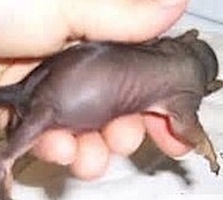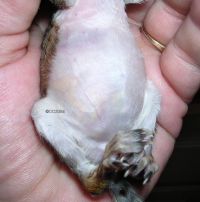5. Common Problems
Bloating. Can occur when a baby squirrel eats too much and/or too often, or from formula intolerance. The stomach should be rounded after feeding, but still soft, like a half-filled water balloon. It should deflate before the next feeding. If stomach feels hard or does not deflate, skip a feeding, hydrate, and decrease the amount of formula at each feeding or increase the amount of time between feedings. Stimulate to potty. Dipping the baby in warm water up to his armpits and gentle massage can also help. A few drops of Gas-X also helps. See pics below:


Clicking (aspiration pneumonia). If formula comes out baby's nose, he may have inhaled some, causing aspiration pneumonia. Symptoms are loss of appetite, lethargy, and a clicking noise when the baby breathes. Hold the baby’s chest to your ear and listen carefully. The clicking is with each breath, in and out. This must be treated immediately with antibiotics or the baby will die.
Constipation. It can take a day or so for the baby to start pooping after starting formula. If constipation persists, it could mean the baby is still dehydrated. In that case, give him warm apple juice in a syringe between feedings. If no results within 12 hours, give a little prune juice. Bathe the baby in very warm water, gently massage the belly and anal area while in the water.
Diarrhea. Can be caused by overfeeding, too frequent feeding, wrong formula, or parasites. If diarrhea is watery, stop feeding formula for a couple of feedings and hydrate instead. It may help to switch to the Homemade Goat Milk Formula. Diarrhea can kill quickly, so get help right away. Note that it is normal for poops to change once they begin formula: normal formula poop is yellow/orange and consists of large, soft nuggets.
Fly Eggs or Maggots. Fly eggs look like small grains of rice; they will quickly hatch into maggots, crawl into the baby’s eyes, ears, mouth, or anus, and eat him alive. Remove all eggs/maggots immediately and check all orifices. Baby must be treated with Capstar within 24 hours. You can buy Capstar (11.4 mg) from us, or at your local pet store. Crush 1/4 tablet, dissolve in 1 ml water, and give orally by syringe once a day for two days. In addition, you can crush 1/2 tablet in 2 ml water and apply externally anywhere maggots/eggs are visible, especially ears, nose, eyes, or anus.
Hypoglycemia. Caused by starvation or feeding too little, or too infrequently. Baby may arch his back, have spasms, or gasp for breath. Rub molasses, honey, or pancake syrup on its gums. You should see improvement within 30 minutes. Make sure your feeding amounts/schedule is correct.
Feeding Trance. While feeding, some babies will stop swallowing and open and close their mouth like a fish. This is not harmful but means feeding takes longer. Blowing lightly in her face or a gentle tap on the head can help. When they stop gulping, you can resume feeding them.
Nursing on Genitals. Baby squirrels may nurse on genitals when they are housed together, causing redness, swelling, or scabbing on the tip of the penis. This is very serious as it can cause permanent damage to the urethra. Immediately separate them. If there’s a scab, soak the area in warm water and gently remove the scab. Then apply some Neosporin. If the baby is self-sucking, you’ll need to apply some kind of bandage until you break the habit.
Refuses to Feed/Blood on Nipple. Baby squirrels teethe twice, once for upper teeth and once for lowers. Teething may cause the baby to suddenly refuse to eat, or eat less than normal, and you may see a little blood. This is normal and should pass after 24 hours.
Smelly Urine. Pee should not smell when the baby pees; this indicates a urinary tract infection. This must be treated with antibiotics; if left untreated, it will cause neurological symptoms, such as head shaking or tilting, loss of balance, etc.
Whenever a baby squirrel isn't doing well, go back to the ABC's
Ask yourself:
- Is he warm?
- Is he hydrated?
- Is he being fed properly? (not too much or too little; not too often or too infrequently)
- Is the formula warm enough? Formula should be very warm--almost hot--or they won't drink enough.
Then address those issues in that order!
Number 1 Killers of Baby Squirrels
- Lack of no-auto-shutoff heating pad: Baby will chill and die
- Wrong formula: Baby fails to grow or gain weight; develops diarrhea, constipation, bloating
- Cheap syringes that stick: Formula gets into baby's lungs causing aspiration pneumonia
- Syringes that are too big: Baby will eat too fast and get aspiration pneumonia
- Overfeeding: Baby develops diarrhea/bloating
- Underfeeding: Baby starves to death (get a scale and feed by weight!)
- Formula not warm enough: Baby doesn't eat the full amount and slowly starves to death
If you need immediate help, you can call 203-214-7427 or 540-750-5088 for help.



